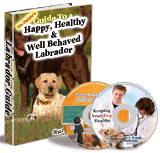Maintaining Your Labrador Retriever's Health
By: Sharda Baker
Hi there,
Sharda Baker here.
In this article, I would like to discuss Labrador Retriever health with
you.
In particular we will discuss how you can help maintain
the health of your Labrador Retriever by learning what to
look out for.
LABRADOR RETRIEVER
HEALTH - PREVENTION REALLY IS BETTER THAN CURE:
As with most things in life, spending a bit of time preventing problems or promptly attending to
them before they get
serious will save
time, effort
and money
over the long run. The same is true with raising your Labrador
Retriever. However, it is important to remember that a dog is not like a car
or a machine, it is a living, breathing, loving member of
your family.
When your pet becomes ill, it can certainly place a great deal of stress on
the whole family. Spending some time on a simple plan
to keep track of your Labrador’s health and well-being will
help
you note if there are any changes in the dogs performance or behavior
that may indicate health concerns, or may require a trip to the vet.
DAILY AND WEEKLY LABRADOR
HEALTH TIPS
Spend a little time
watching your Labrador every day.
Note if they are interacting with other dogs or people in the family,
or staying isolated. If your dog is normally aloof this is not a
concern, but a normally social dog that does not want to interact could
be ill or in pain.
Watch how your dog moves, and note any stiffness or changes in gait.
Keep track of this from day to day to monitor if it disappears, stays
the same or gets worse. Dogs, just like people, can overexert
themselves resulting in stiffness. The older the dog
the more likely this is to occur. Try to limit the strenuous activity
that older dogs are asked to do, as they often will do their best to
keep up, even though it is painful for them.
Watch your dog eat. Make sure that they are chewing their food and not
gulping it down. Labradors may gulp their food if they are not being
fed enough and are constantly hungry, or if they have dental problems
and find chewing painful.
Watch for any blood in the saliva around the mouth when
eating.
If the dog is overly hungry, increase the amount of food that is being
fed, or feed several small meals a day rather than one or two larger
meals, but keep an eye on your Labrador's weight.
Monitor the amount of water the dog is consuming. Drinking too much water
can be a sign of several health conditions such as diabetes. Drinking
water and then continued vomiting should be noted, and immediate
veterinary advice and / or assistance sought. Many conditions
of
the kidneys, liver and digestive tract can be detected early by the
amount of water that is consumed. A dog that is not drinking enough
water may have kidney conditions, that can lead to toxicity if the dog
stops urinating.
Check to make sure that there is adequate fresh clean
water for the dog, as often a dog will not drink unclean
or fouled water.
Watch for any
irregular activity
in either urination or bowel movements. Diarrhea is common when food is
changed or excessive table scraps are being fed. It can also be a
symptom of serious and life threatening diseases such as parvovirus if
it continues.
If the diarrhea does not clear up in two to three days, the dog should
go to the vet. The vet may require that you bring in a stool sample to
help with the diagnosis. In addition, some worms or internal parasites
may be visible in the stool. Roundworms and hookworms can be fatal to
puppies, and can also be transmitted to humans. Worms can also cause
anemia and poor overall health and coat conditions
WEEKLY TO MONTHLY
It is a good idea to weigh your Labrador Retriever once a month.
Overweight dogs, like overweight humans, have greater risks for many
health conditions. Weighing your dog will help you monitor if it is
eating properly and not overeating. If you notice that the dog is
gaining weight, try decreasing the food a bit at a time, cutting out
the table scraps or treats, and increasing exercise.
Much
the same way we should manage our weight!
Spend time exercising with your dog and note if there are any changes
in the dogs stamina or general fitness level. Labradors do require
regular exercise.
Trim your dogs nails, clean their ears and eyes and check the condition
of their skin at least once a month. Run your hands completely over the
dog to check for any swellings, tumors or growths. Watch for dry or
scaly patches on the skin or hair loss. These can be signs of fleas,
mites or mange conditions.
Schedule regular vet visits for your Labrador – adult or
puppy. Follow all vaccination
schedules and report any changes in your dogs behavior or
condition to the vet if they do not clear up in 24-48 hours.
The old saying “An
ounce of prevention is worth a pound of cure”
is really crucial when working with your Labrador or any pet for that
matter. They don’t have the ability to talk for themselves;
they
have to rely on your attention to them to note if they are not well or
need any changes in their environment. Acting sooner rather than later
will catch any problems before they lead to larger complications.
For further information please see our Insider's
Guide To The Labrador ebook and audio package.
All the best.
Until next time.
Sharda B.
Dedicated
To Making All Of Your Dog Experiences Happy Ones!
